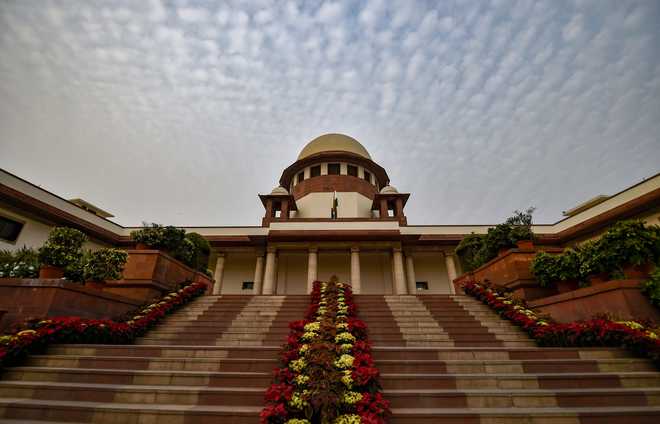
File photo of the Supreme Court.
Satya Prakash
Tribune News Service
New Delhi, November 28
More than 30 years after two young men and a woman fell prey to honour killing for violating caste-ridden societal norms at Barsana in Uttar Pradesh, the Supreme Court has upheld the conviction of 23 accused and acquitted three others in view of ambiguity in their identity.
A Bench led by Justice LN Rao lamented that even after 75 years of Independence, caste motivated violence and honour killings were taking place in India, impeding the constitutional objective of equality.
“These episodes of caste motivated violence in the country demonstrate the fact that casteism has not been annihilated even after 75 years of Independence. According to Dr BR Ambedkar, inter-caste marriage is one remedy to get rid of casteism in order to achieve equality. His vision for ensuring justice and equality to all sections of the society, especially to the repressed segments, is well enshrined in the preamble of the Constitution. The bigotry perpetuated by such caste-based practices which are prevalent even today, impedes this objective of the Constitution of equality for all its citizens,” the Bench said.
Noting that a marriage proposal by Roshni belonging to Jat community, with Vijendra—a Jatav—resulted in their deaths, the top court said, “Though the number is a tad less, honour killings have not stopped in this country and it is high time that the civil society reacts and responds with strong disapproval about the ghastly crimes committed in the name of caste.”
Recalling the directions to the administrative authorities and police officials to take strong measures to prevent honour killings and the Law Commission’s report on the issue, the Bench emphasised that harsh punishment was recommended to those “brutal and feudal minded persons” who commit atrocities in the name of caste.
Twenty witnesses were examined by the prosecution and four witnesses were produced by the defence. When the trial resumed in 1998, 12 out of the 20 prosecution witnesses turned hostile. The trial was stayed for six years between 1992 and 1998 due to orders passed by the Allahabad High Court.
“Even if the witnesses have turned hostile, their evidence can be accepted, if they are natural and independent witnesses and have no reason to falsely implicate the accused,” it said, adding, as a protector of its citizens, the state has to ensure that during a trial a witness can safely depose the truth, without any fear of being haunted by those against whom he or she has deposed.
“This unfortunate situation prevails because of the reason that the state has not undertaken any protective measures to ensure the safety of these witnesses, commonly known as ‘witness protection’,” the Bench said, referring to an earlier judgment of the top court.
Join Whatsapp Channel of The Tribune for latest updates.



























